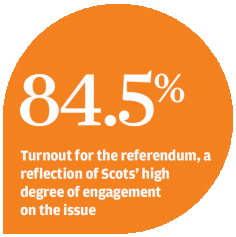
Update | Referendum start of change for UK, say Scotland's 'Yes' and 'No' camps
David Cameron, 'the man who saved the union', must now deliver on vow of constitutional reform
Scotland's "No" to independence may have saved British Prime Minister David Cameron his job, but sweeping pledges of a constitutional shake-up could undermine his re-election drive and trigger more political instability.

He also said he wanted to see more powers devolved to Wales and Northern Ireland, as well as changes for England, starting with new voting arrangements in the British parliament.
Some, including in his own party, feel he promised too much.
"This result presents both opportunities and challenges for Cameron," said Matthew Ashton, a politics lecturer at Nottingham Trent University. "On the one hand he can make claim to the title of 'the man who saved the union'. On the other, he'll now have to deliver on his extraordinary ambitious promises of a new constitutional settlement."
In the closing phase of the referendum campaign, Cameron and other party leaders made detailed promises to Scotland, about future funding and new tax and spending powers - a move some of his own lawmakers described as a "panicky" response to opinion polls that suggested the vote was too close to call. It will be difficult for him to renege.
"The genie of a more devolved UK can't be put back in the bottle," a senior source in the Liberal Democrats, Cameron's coalition partner, said. "The world has changed."
Cameron, who might have been cast aside by his party as the leader who lost Scotland had the vote gone the other way, said the constitutional changes should be agreed as a package by the main political parties before the next election, so that they could be implemented in the next 2015-2020 parliamentary term.
With Scotland being given more say over its own affairs, Cameron says lawmakers from England - which comprises 83 per cent of the British population - should also have a way to decide issues for themselves. That might mean setting up a system to keep Scottish members of the British parliament from voting on UK policies that do not apply to self-ruling Scots.
Such a system could be good for Cameron's Conservatives, whose base is in England and who have been all but wiped out in Scotland. But it is tricky for the opposition Labour Party, which relies on Scottish support in Westminster and whose last UK prime minister, Gordon Brown, was a Scot.
It is hard to see a quick consensus emerging within months among major parties about a reform that could cost a future Labour government the power to pass laws through an English caucus potentially controlled by the Conservatives.
Labour leader Ed Miliband said plans for change needed to be put to members of the public through a constitutional convention. Labour proposed the constitutional convention for autumn 2015 - after the next general election - which Cameron's Conservatives said amounted to kicking the issue "into the long grass".
Across the political spectrum, politicians said Cameron had opened up a question that would be hard to solve quickly because of partisan political differences and could hand an electoral gift to populists such as the anti-EU UK Independence Party (UKIP). Such wrangling also risks political paralysis.
Failure to deliver greater powers to English lawmakers could leave Cameron vulnerable to the electoral threat of UKIP, whose leader Nigel Farage promised to champion English voters.
Conservative lawmaker Andrew Percy said Cameron's proposal to allow only parliamentarians from English constituencies to vote on English matters was welcome, but was not enough.
"Now it's England's turn for a say and we won't settle with being fobbed off with a few crumbs of change," he said. "That means a proper conversation about an English Parliament, English Executive and English First Minister."
Boris Johnson, the mayor of London and a potential successor to Cameron as Conservative leader, said Cameron's promise to maintain Scotland's current funding deal - which means Scots get substantially more government money spent on them per head than the English - was "slightly reckless" and should not be honoured in its current form.
Mike Crockart, an Edinburgh Liberal Democrat member of the Westminster parliament, said: "We must deliver what the people have asked for - a stronger Scotland within the UK - and we shall start today."
Asked if he thought similar demands for more powers for English regions would muddy the waters, he replied: "That should not stand in the way of the Scottish people getting what they asked for."

